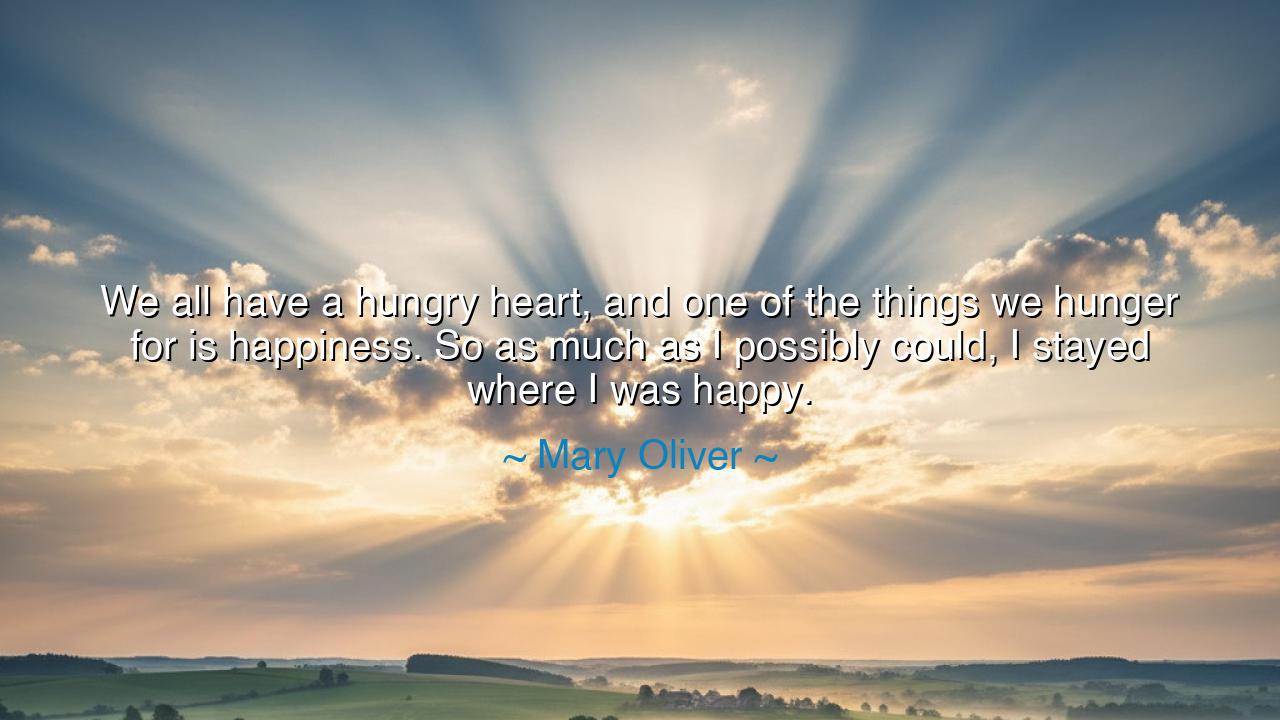
We all have a hungry heart, and one of the things we hunger for
We all have a hungry heart, and one of the things we hunger for is happiness. So as much as I possibly could, I stayed where I was happy.






"We all have a hungry heart, and one of the things we hunger for is happiness. So as much as I possibly could, I stayed where I was happy." — Mary Oliver
So speaks Mary Oliver, the poet of quiet mornings and trembling leaves, whose wisdom was born not from temples or courts, but from the hush of forests and the song of rivers. In this simple truth, she reveals a law as old as the human soul — that every being carries within a hungry heart, an unending desire to seek that which gives it light. From the moment of birth, we are drawn toward warmth, toward beauty, toward meaning. And yet, few among us have the wisdom to dwell where our hearts are nourished. Oliver, with her soft but steadfast spirit, teaches that happiness is not to be chased like prey, but to be recognized and abided in when it appears.
The hungry heart is not a weakness; it is the pulse of life itself. It hungers for truth, for love, for peace, for belonging. It drives the artist to create, the seeker to question, the wanderer to roam. But in our endless striving, we often mistake restlessness for purpose. We run from place to place, thought to thought, chasing a joy that was already within our reach. Mary Oliver’s wisdom lies in her refusal to flee the moment. When she found happiness, she did not question it, analyze it, or seek to make it grander — she simply stayed. She understood that joy, like a wild creature, must be approached with reverence and stillness, or it will vanish into the forest once more.
This truth is woven into her own life. Born into hardship and solitude, Mary Oliver found refuge not in society’s noise, but in nature’s quiet grace. The fields, the ponds, the geese, the trees — these became her teachers. She walked where her spirit could breathe, wrote where her soul could sing. Many mocked her simplicity, calling her life small. Yet from that stillness came poetry that has outlived the thrones of kings. She stayed where she was happy, and because she stayed, she created beauty enough for the world to share. Her hunger found its feast not in grandeur, but in gratitude.
We might remember the ancient tale of Diogenes, the philosopher who lived in a barrel and owned nothing, yet was richer in spirit than any emperor. When Alexander the Great asked what he could do for him, Diogenes simply replied, “Stand out of my sunlight.” Like Oliver, he had learned that happiness is not something given by power or wealth, but found in contentment — in dwelling where the heart feels at home. To stay where you are happy is not an act of laziness, but of wisdom. It is the courage to honor what is true to your nature, even when the world calls you elsewhere.
Yet, how rarely do we follow this counsel. We are taught to chase success, to abandon joy for ambition, to leave peace in pursuit of progress. We uproot ourselves from the gardens where we bloom, believing happiness must be earned elsewhere. But Oliver’s voice calls to us like a bell at twilight: Stay. Stay where your heart is alive, where your laughter comes easily, where your soul feels light. For happiness, once found, is not a trap but a sanctuary. To leave it needlessly is to betray the very hunger that drives you.
The hungry heart will never be silenced — nor should it be. It is our compass, pointing always toward what nourishes us. But we must learn to listen, to discern between the hunger that builds us and the hunger that destroys us. The wise heart seeks happiness not in endless consumption, but in presence. It learns to dwell in gratitude for the moment — to see that the sunlight through a window, the voice of a friend, the work of one’s own hands can be enough. This is the art of staying: to be faithful to joy when it arrives, and not to let fear or restlessness drive it away.
So, my listener, take this lesson to heart: seek happiness, but when you find it, stay. Do not let the illusions of more and better lure you from the place where your spirit is at peace. Guard your joy as you would guard a sacred flame. Build your life around what gives you meaning, and trust that in doing so, your hungry heart will be fed. For in the end, happiness is not a distant country to be conquered — it is the home we carry within us, waiting for us to stop wandering and finally, quietly, stay.






AAdministratorAdministrator
Welcome, honored guests. Please leave a comment, we will respond soon